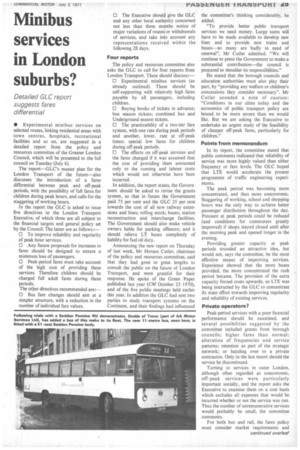Minibus services in London suburbs?
Page 27

If you've noticed an error in this article please click here to report it so we can fix it.
Detailed GLC report suggests fares differential • Experimental minibus services on selected routes, linking residential areas with town centres, hospitals, recreational facilities and so on, are suggested in a detailed report from the policy and resources committee of the Greater London Council, which will be presented to the full council on Tuesday (July 6).
The report—GLC 's master plan for the London Transport of the future—also discusses the introduction of a fares differential between peak and off-peak periods, with the possibility of full fares for children during peak hours, and calls for the staggering of working hours.
In the report the GLC is asked to issue five directives to the London Transport Executive, of which three are all subject to the financial targets and general policy set by the Council. The latter are as follows:— O To improve reliability and regularity of peak-hour services.
O Any future proposals for increases in fares should be designed to ensure a minimum loss of passengers.
O Peak-period fares must take account of the high cost of providing these services. Therefore children should be charged full adult fares during these periods.
The other directives recommended are: O Bus fare changes should aim at a simpler structure, with a reduction in the number of individual fare values. O The Executive shout give the GLC and any other local auth rity concerned not less than three m ths notice of major variations of routes or withdrawals of services, and take into account any representations received within the following 28 days.
Four reports The policy and resources committee also asks the GLC to call for four reports from London Transport. These should discuss: O Experimental minibus services (as already outlined). These should be self-supporting with relatively high fares payable by all passengers, including children.
O Buying books of tickets in advance; bus season tickets; combined bus and Underground season tickets.
O The practicability of a two-tier fare system, with one rate during peak periods and another, lower, rate at off-peak times; special low fares for children during off-peak periods.
O The effects on off-peak services and the fares charged if it was assumed that the cost of providing them amounted only to the running and labour costs which would not otherwise have been incurred.
In addition, the report states, the Government should be asked to revise the grants system, so that in future the Government paid 75 per cent and the GLC 25 per cent towards the cost of all new railway extensions and lines; rolling stock; buses; station reconstruction and interchange facilities. The Government should also make vehicle owners liable for parking offences; and it should relieve LT buses completely of liability for fuel oil duty.
Announcing the new report on Thursday of last week, Mr Horace Cutler, chairman of the policy and resources committee, said that they had gone to great lengths to consult the public on the future of London Transport, and were grateful for their response. He spoke of the Green Paper published last year (CM October 23 1970), and of the five public meetings held earlier this year. In addition the GLC had sent two parties to study transport systems on the Continent, and their findings had influenced
the committee's thinking considerably, he added.
"To provide better public transport services we need money. Large sums will have to be made available to develop new lines and to provide new trains and buses—so many are badly in need of renewal", Mr Cutler admitted. "We will continue to press the Government to make a substantial contribution—the council is prepared to shoulder its responsibilities."
He stated that the borough councils and education authorities must also play their part, by "providing any welfare or children's concessions they consider necessary". Mr Cutler sounded a note of caution: "Conditions in our cities today and the economics of public transport policy are bound to be more severe than we would like. But we are asking the Executive to undertake an urgent study of the feasibility of cheaper off-peak fares, particularly for children."
Points from memorandum In its report, the committee stated that public comments indicated that reliability of service was more highly valued than either frequency or fare levels. The GLC hoped that LTE would accelerate the present programme of traffic engineering experiments.
The peak period was becoming more concentrated, and thus more uneconomic. Staggering of working, school and shopping hours was the only way to achieve better passenger distribution throughout the day. Pressure at peak periods could be reduced (and conditions for commuters greatly improved) if shops stayed closed until after the marring peak and opened longer in the evening.
Providing greater capacity at peak periods sounded an attractive idea, but would not, says the committee, be the most effective means of improving services. Experience showed that the more buses provided, the more concentrated the rush period became. The provision of the extra capacity forced costs upwards, so LTE was being instructed by the GLC to concentrate its main effort towards improving regularity and reliability of existing services.
Private operators?
Peak-period services with a poor financial performance should be examined, and several possibilities suggested by the committee included grants from borough councils; higher fares than normal; alteration of frequencies and service patterns; retention as part of the strategic network; or handing over to a private contractor. Only in the last resort should the service be discontinued.
Turning to services in outer London, although often regarded as uneconomic, off-peak services were particularly important socially, and the report asks the Executive to examine them on a cost basis which excludes all expenses that would be incurred whether or not the service was run. Thus the number of unremunerative services would probably be small, the committee comments.
For both bus and rail, the fares policy must consider market requirements and continued overleaf




































































































